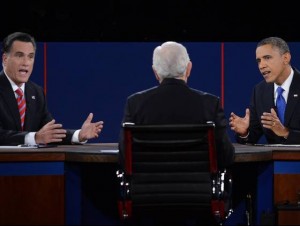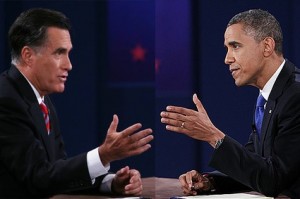China & the Presidential Debate
 On Monday night, the world experienced the third and final presidential debate. This time, topic was pure foreign policy, or at least it was suppose to be. Needless to say, China Law & Policy was anxiously watching – China’s rise was supposed to be one of the few subjects to be discussed.
On Monday night, the world experienced the third and final presidential debate. This time, topic was pure foreign policy, or at least it was suppose to be. Needless to say, China Law & Policy was anxiously watching – China’s rise was supposed to be one of the few subjects to be discussed.
After an hour and twenty minutes, the debate finally turned to China. With less than ten minutes, each candidate was forced to discuss his policy toward the world’s second largest economy and a rising global power.
Was ten minutes sufficient to discuss a foreign policy matter as important as our economic, military and moral relationship with China? Absolutely not. One hopes that the next president has a policy toward China that is more complicated than what can be explained in less than his allotted five minutes.
But in all fairness, the lack of attention to China was likely not a result of ignorance of China’s importance vis-a-vis the United States. This debate is for the American people and let’s face it, right now the Middle East is at the forefront of most American minds. For the past few months, Syria, Iran, Afghanistan, Pakistan, or Libya, have appeared on the front page of major national newspapers; it’s in this region where American lives are on the line on a daily basis; and with all the saber rattling in the region there is a very real fear amongst Americans that the U.S. entanglement in a third war in the region is a possibility.
While we would have liked to have seen more discussion on China, the focus and time spent on the Middle East was necessary. And hey, China should feel lucky – it got more time than the European debt crisis (0 minutes) which arguably is a much more time-sensitive crisis with severe, global repercussions.
But back to China. Between the two candidates, there was no clear winner or loser in terms of China. The only real loser was Bob Schieffer who pivoted to the China topic by saying “Let’s turn to China. Mr. President what is the U.S.’ biggest national security threat?” Gee Bob, I wonder who YOU think is the biggest national security threat. Not surprisingly, neither candidate fell into Bob’s trap.
pivoted to the China topic by saying “Let’s turn to China. Mr. President what is the U.S.’ biggest national security threat?” Gee Bob, I wonder who YOU think is the biggest national security threat. Not surprisingly, neither candidate fell into Bob’s trap.
What was the most interesting aspect of the debate was that it was perhaps the clearest representation of how similar China policy is and has always been between the two parties. Each candidate began his statement on the importance of the U.S.-China trade dealings and the symbiotic relationship between the two countries. Neither candidate discussed cutting or changing this mutually dependent relationship. Instead, each candidate underscored the need for China to “play by the rules” and trade fair – Obama highlighted the many WTO cases his administration has brought, and won against China, and Romney emphasized the need to protect intellectual property. So in reality, the two China policies were pretty much the same. Two key differences, and where each candidate lost equal points, were the following:
- Romney declaring China a currency manipulator. Romney has promised to declare China a currency manipulator on his first day in office. But what he doesn’t mention is that this declaration is largely symbolic – like Amtrak declaring May 10 National Train Day – it’s sort of self-serving. As Bloomberg noted in a great article about this last week, presidential declaration of currency manipulation does nothing. All it would do would be for the Secretary of the Treasury to analyze whether the president’s claim is true using a specific formula. If it is, then the Treasury Secretary is required to work with the International Monetary Fund to negotiate a solution with the offending nation. There is no guidance about what to do if negotiations fail. So basically, Romney’s plan is to do what is currently being done – negotiating with China to limit its currency manipulation.
- Obama highlighting the need for government to support the green tech industry. Obama reinforced the need for government funding for industries like green tech so as to compete with China. Romney was critical of government’s role and thought that funding of industries should be left to business and venture capitalists. China Law & Policy has long maintained that government policies and funding of green technology is important in maintaining any competitive advantage over China. (See How China Beat the U.S. and Became the New Green Tech Giant). But what Obama failed to mention is that one of the bills that could have kept us in competition with China – the Climate Change Bill – failed to pass a Democratic-controlled Senate (after passing the Democratic House).
Missing from the discussion was any mention of the Senkaku/Diaoyutai islands, the U.S. military’s abysmal relations with the Chinese military, reasserting US power in the region, potential Chinese cyberattacks, or human rights.
In the end, the debate did little to distinguish between the two candidates in terms of China. Anyone who is an undecided because of China issues will likely stay that way.
 On Facebook
On Facebook By Email
By Email 

This was very well-said. One thing that continues to bother me about American politics (especially in the context of this presidential election) is the degree to which both candidates see China-bashing as an easy way to score quick political points. The accusations that China “steals American jobs” do have an influence on the way the public thinks about that nation. It is difficult to be partners with a country when the majority of Americans see it as a threat rather than as an ally. Some of that is certainly the result of political posturing over China. What are your thoughts on China-bashing as a political strategy?
I’m not clear how Obama lost points based on the statements you quote. It sounds like he argued for ideas that have been presented here as well. Obama’s strategies for his dealings with Congress share some of the blame for the failure of the climate change bill, but it was the threat of the Republican filibuster and the need for 60 votes that ultimately finished it off. It’s undisputed that the high bar erected by Republican intransigence made passage more challenging than simply garnering 51 votes. Republicans, including Romney, have also gone out of their way to make any support for green-tech anathema. Romney’s accusations — in the first debate and his frequent claim that the government “shouldn’t pick winners” — make it increasingly difficult for the government to support fledgling energy innovators.
[…] policies put forward by the two candidates, wrote Elizabeth M. Lynch at China Law & Policy, “were pretty much the same”, and they did not so much as touch on the sensitive territorial dispute between China and Japan […]